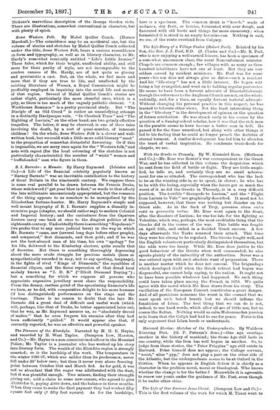With the Greeks in Thessaly. By W. Kinnaird Rose. (Methuen
and Co.)—Mr. Rose was Renter's war correspondent in the Greek War, and he has collected in this volume the despatches which he sent from the field of battle or flight. They are little ampli- fied, he tells us, and certainly they are no small achieve- ment for one so situated. The correspondent who has the luck to be on the winning side is, so to speak, in clover ; he who has to be with the losing, especially when the losers get so much the worst of it as did the Greeks in Thessaly, is in a very difficult position. The terrible " Stampede to Larissa," and the " Flight from Larissa to Volo " are graphically described. It must not be supposed, however, that there was nothing but disaster on the Greek side. As in the Sack of Troy, quondam etiarn vietis redit in prucordia virtus. Mr. Rose went again to the front, after the disasters of Larissa; he was too late for the fighting at Velestino, which was, perhaps, the most creditable thing that the Greeks did in the course of the war. This battle was fought on April 30th, and ended in a decided Greek success. A few days afterwards the Turks renewed their attack. This time they were too strong to be repulsed. The Greeks fought well, and the English volunteers particularly distinguished themselves, but the odds were too heavy. While Mr. Rose does justice to the good behaviour of the Greeks when well commanded, he also speaks plainly of the imbecility of the authorities. Never was a war entered upon with such absolute want of preparation. There is another matter which he does not conceal. The brigandage which developed itself when the Greek retreat had begun was disgraceful, one cannot help saying, to the nation. It ought not to have been possible whatever had happened. No such thing could have taken place among the French in 1870. We quite agree with the moral which Mr. Rose draws from his story. The vacillation of the European Concert constitutes a great danger. And of all pernicious nonsense the worst is the counsel that we must speak with bated breath lest we should inflame the fanaticism of Islam. The best thing that we can do is not, indeed, to use hard words, which after all are of little use, but to coerce the Sultan. Nothing would so calm Mahommedan passion as to learn that the Caliph had had to sue for peace. Force is the only argument that Islam heeds or understands.


































 Previous page
Previous page